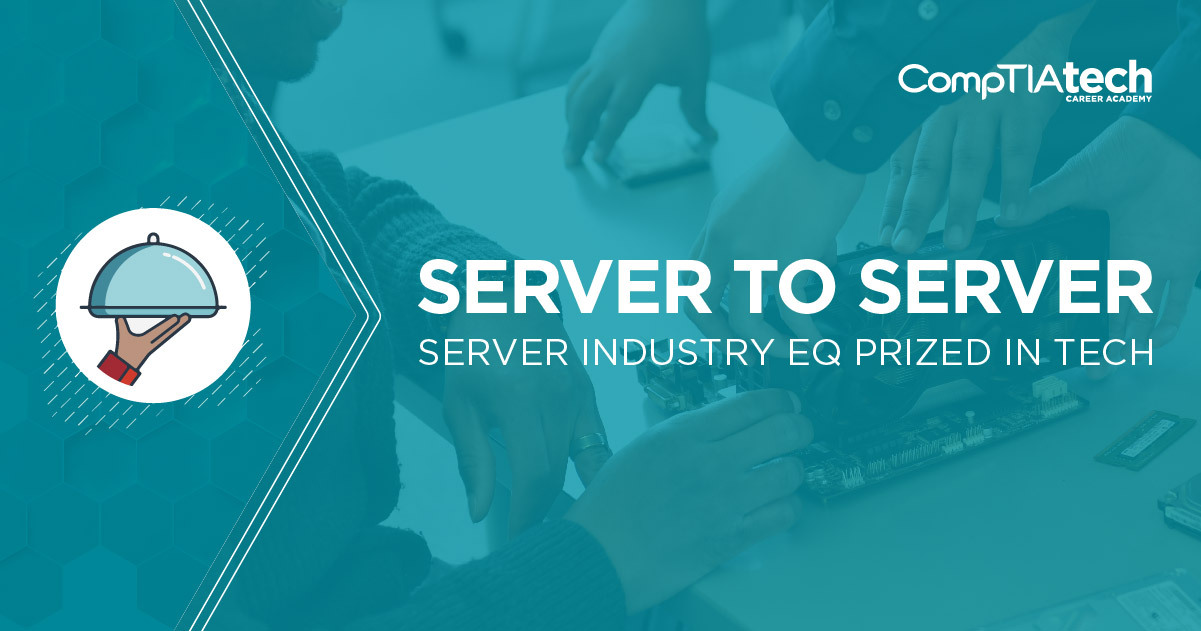 In this monthly series of blog posts called Server to Server, CompTIA explains why service-industry workers make ideal candidates for entry-level positions in information technology. In this fifth article, we delve more into the question, “Do my service industry skills translate relatable skills needed by the tech industry?” The answer is a resounding, “Yes!”
In this monthly series of blog posts called Server to Server, CompTIA explains why service-industry workers make ideal candidates for entry-level positions in information technology. In this fifth article, we delve more into the question, “Do my service industry skills translate relatable skills needed by the tech industry?” The answer is a resounding, “Yes!”
Although “information technology” makes it sound as though the profession is grounded in code and wires, the tech industry really consists of fallible humans — just like every other field.
And wherever fallible — and often frustrated — humans work, it’s best to embed team-oriented empathetic listeners with creativity and good problem-solving skills.
That’s why the most successful tech industry professionals generally have strong emotional intelligence, sometimes called EQ, emotional IQ, or “soft” professional skills. Many hiring managers actually are moving away from the term “soft skills” because they feel it undermines the critical importance of such character traits.
“Never mind that the so-called soft skills are actually the hard ones,” Matthew J. Daniel wrote for Chief Learning Officer. “They are more challenging to obtain and require a deeper and more enduring commitment.”
Daniel advocates for using the terms durable skills and perishable skills instead. And Gina Filigenzi, IT director for the City of Minneapolis, said that when she vets job candidates, she cares more about whether they possess robust people skills than technical ones.
“Customer service, an eagerness to help, resourcefulness — all of that outweighs technical chops,” she said. “The technical stuff can be learned.”
Service industry workers uniquely poised to switch to IT, thanks to their strong EQs
Baristas, cashiers, cooks, drivers, receptionists, sales associates, waiters — all have an enormous advantage when it comes to transitioning into the tech industry: They actively listen to people and will work to solve someone’s problem.
Other examples of emotional intelligence include conflict resolution, collaboration, flexibility, the ability to accept constructive feedback, resourcefulness, clear and proactive communication, respect, self-motivation, initiative and integrity.
After getting laid off from his $15-an-hour warehouse job at Staples in 2013, Theo Hysell attended tech training offered by CompTIA Tech Career Academy and graduated with CompTIA A+ certification. Since then, Hysell earned multiple security-related certifications on his own and has worked his way up the tech career ladder to senior IT security analyst with TCF Bank in the Twin Cities.
Hysell credits his strong EQ for his upward career trajectory.
“We spent a lot of time covering soft professional skills and the importance of network building and without a doubt, that is the reason I am where I am today,” he said of his training. “Being honest and polite, passionate about what you’re doing, building professional relationships — that’s what’s gotten me to this point.”
Top job performers in all fields possess strong people skills; that’s true for IT, too
According to the World Economic Forum, 90 percent of top job performers have high emotional intelligence. Only 20 percent of bottom performers have high emotional intelligence.
Moreover, emotional intelligence is a flexible skillset acquired and improved with practice. Service-industry veterans perform their jobs while mindful of taking good care of a customer — and that attitude is critical in information technology as well.
Technologists new to IT usually start as a help desk technician — a role that develops hard technical skills and soft professional skills, and positions new technologists for future career advancement in both responsibility and salary. Besides being the perfect springboard to a long-term tech career, help desk jobs abound and can be readily secured with CompTIA A+ certification.
If you’d like to learn more about switching from server to server, visit CompTIA’s microsite on careers in IT.

